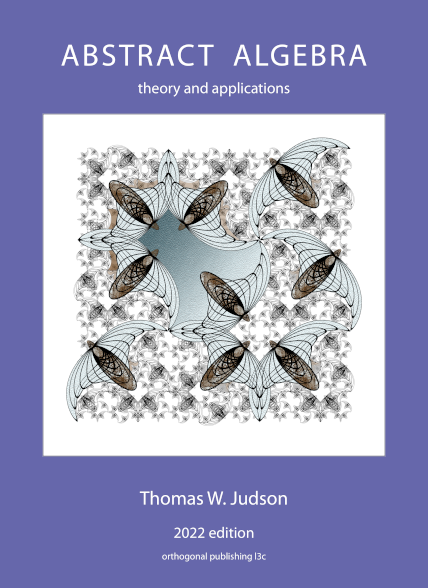Exercises 13.4 Exercises
1.
Find all of the abelian groups of order less than or equal to \(40\) up to isomorphism.
2.
Find all of the abelian groups of order \(200\) up to isomorphism.
3.
Find all of the abelian groups of order \(720\) up to isomorphism.
4.
Find all of the composition series for each of the following groups.
\(\displaystyle {\mathbb Z}_{12}\)
\(\displaystyle {\mathbb Z}_{48}\)
The quaternions, \(Q_8\)
\(\displaystyle D_4\)
\(\displaystyle S_3 \times {\mathbb Z}_4\)
\(\displaystyle S_4\)
\(S_n\text{,}\) \(n \geq 5\)
\(\displaystyle {\mathbb Q}\)
5.
Show that the infinite direct product \(G = {\mathbb Z}_2 \times {\mathbb Z}_2 \times \cdots\) is not finitely generated.
6.
Let \(G\) be an abelian group of order \(m\text{.}\) If \(n\) divides \(m\text{,}\) prove that \(G\) has a subgroup of order \(n\text{.}\)
7.
A group \(G\) is a torsion group if every element of \(G\) has finite order. Prove that a finitely generated abelian torsion group must be finite.
8.
Let \(G\text{,}\) \(H\text{,}\) and \(K\) be finitely generated abelian groups. Show that if \(G \times H \cong G \times K\text{,}\) then \(H \cong K\text{.}\) Give a counterexample to show that this cannot be true in general.
9.
Let \(G\) and \(H\) be solvable groups. Show that \(G \times H\) is also solvable.
10.
If \(G\) has a composition (principal) series and if \(N\) is a proper normal subgroup of \(G\text{,}\) show there exists a composition (principal) series containing \(N\text{.}\)
11.
Prove or disprove: Let \(N\) be a normal subgroup of \(G\text{.}\) If \(N\) and \(G/N\) have composition series, then \(G\) must also have a composition series.
12.
Let \(N\) be a normal subgroup of \(G\text{.}\) If \(N\) and \(G/N\) are solvable groups, show that \(G\) is also a solvable group.
13.
Prove that \(G\) is a solvable group if and only if \(G\) has a series of subgroups
where \(P_i\) is normal in \(P_{i + 1}\) and the order of \(P_{i + 1} / P_i\) is prime.
14.
Let \(G\) be a solvable group. Prove that any subgroup of \(G\) is also solvable.
15.
Let \(G\) be a solvable group and \(N\) a normal subgroup of \(G\text{.}\) Prove that \(G/N\) is solvable.
16.
Prove that \(D_n\) is solvable for all integers \(n\text{.}\)
17.
Suppose that \(G\) has a composition series. If \(N\) is a normal subgroup of \(G\text{,}\) show that \(N\) and \(G/N\) also have composition series.
18.
Let \(G\) be a cyclic \(p\)-group with subgroups \(H\) and \(K\text{.}\) Prove that either \(H\) is contained in \(K\) or \(K\) is contained in \(H\text{.}\)
19.
Suppose that \(G\) is a solvable group with order \(n \geq 2\text{.}\) Show that \(G\) contains a normal nontrivial abelian subgroup.
20.
Recall that the commutator subgroup \(G'\) of a group \(G\) is defined as the subgroup of \(G\) generated by elements of the form \(a^{-1} b ^{-1} ab\) for \(a, b \in G\text{.}\) We can define a series of subgroups of \(G\) by \(G^{(0)} = G\text{,}\) \(G^{(1)} = G'\text{,}\) and \(G^{(i + 1)} = (G^{(i)})'\text{.}\)
-
Prove that \(G^{(i+1)}\) is normal in \((G^{(i)})'\text{.}\) The series of subgroups
\begin{equation*} G^{(0)} = G \supset G^{(1)} \supset G^{(2)} \supset \cdots \end{equation*}is called the derived series of \(G\text{.}\)
Show that \(G\) is solvable if and only if \(G^{(n)} = \{ e \}\) for some integer \(n\text{.}\)
21.
Suppose that \(G\) is a solvable group with order \(n \geq 2\text{.}\) Show that \(G\) contains a normal nontrivial abelian factor group.
22. Zassenhaus Lemma.
Let \(H\) and \(K\) be subgroups of a group \(G\text{.}\) Suppose also that \(H^*\) and \(K^*\) are normal subgroups of \(H\) and \(K\) respectively. Then
\(H^* ( H \cap K^*)\) is a normal subgroup of \(H^* ( H \cap K)\text{.}\)
\(K^* ( H^* \cap K)\) is a normal subgroup of \(K^* ( H \cap K)\text{.}\)
\(H^* ( H \cap K) / H^* ( H \cap K^*) \cong K^* ( H \cap K) / K^* ( H^* \cap K) \cong (H \cap K) / (H^* \cap K)(H \cap K^*)\text{.}\)
23. Schreier's Theorem.
Use the Zassenhaus Lemma to prove that two subnormal (normal) series of a group \(G\) have isomorphic refinements.
24.
Use Schreier's Theorem to prove the Jordan-Hölder Theorem.
